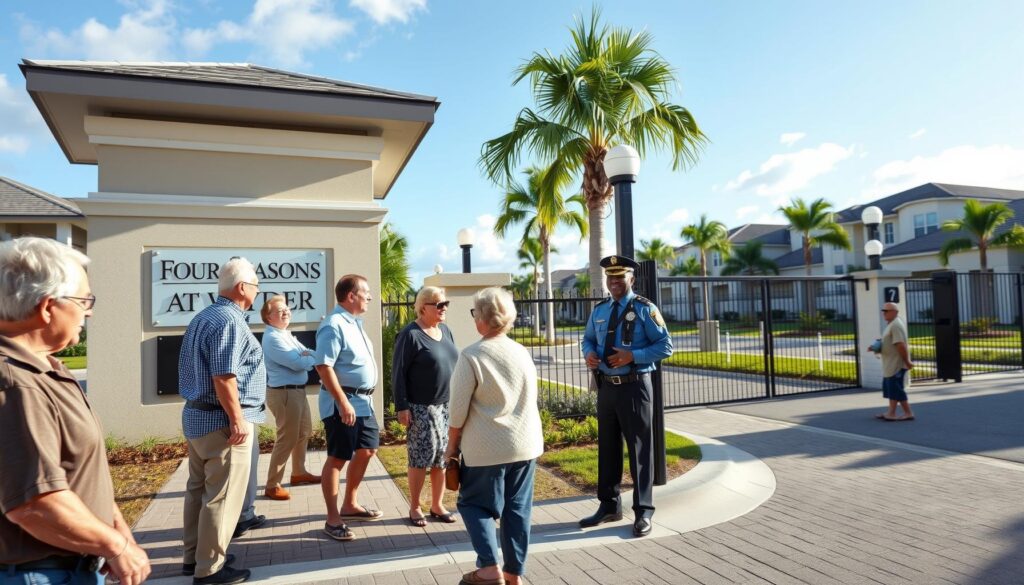Retirement budgeting Florida is essential for seniors considering a move to one of the state’s popular 55+ communities. Understanding the cost of retirement living in Florida helps retirees make informed financial decisions and ensures a comfortable lifestyle in their golden years.
Understanding the Cost of Retirement Living in Florida
When budgeting for retirement in Florida, seniors must consider various expenses beyond housing. These include healthcare, utilities, groceries, transportation, and recreational activities. Florida’s cost of living is relatively affordable compared to many other states, but expenses vary significantly depending on the specific location and community amenities.
Housing Costs in 55+ Communities Florida
Housing typically represents the largest expense in retirement budgeting. In Florida, 55+ communities offer diverse housing options, including single-family homes, condos, townhouses, and manufactured homes. Prices range widely, with condos and manufactured homes generally being more affordable, while single-family homes in upscale communities can be significantly pricier.
Average home prices in Florida’s active adult communities range from approximately $150,000 to over $500,000, depending on location, size, and amenities offered. Monthly homeowner association (HOA) fees, which cover maintenance, amenities, and community services, typically range from $100 to $500 per month. For a detailed breakdown, explore our guide on the cost of living in Port St. Lucie 55+ communities.
Healthcare Expenses in Retirement
Healthcare expenses are a critical factor in retirement budgeting Florida. Medicare covers many healthcare costs for seniors aged 65 and older, but supplemental insurance plans and out-of-pocket expenses should be considered. Florida offers numerous healthcare providers and facilities specializing in senior care, making it easier for retirees to access quality healthcare services.
On average, retirees in Florida can expect to spend around $500 to $800 monthly on healthcare, including premiums, prescriptions, and medical services not fully covered by Medicare.
Daily Living Expenses in Florida Retirement Communities
Beyond housing and healthcare, daily living expenses significantly impact retirement budgeting. These include groceries, utilities, transportation, entertainment, and dining out.
Grocery and Utility Costs
Florida grocery prices are generally in line with the national average, with retirees typically spending between $250 and $400 per month per person. Utility costs, including electricity, water, and internet, average around $150 to $300 monthly, depending on home size and usage.
Transportation and Entertainment Expenses
Transportation costs vary based on lifestyle choices. Many retirees in Florida’s 55+ communities own vehicles, with monthly expenses for fuel, insurance, and maintenance averaging around $200 to $400. Public transportation and community shuttle services are available in many areas, providing affordable alternatives.
Entertainment and recreational activities are abundant in Florida, from golf and tennis to cultural events and dining. Retirees typically budget between $100 and $300 monthly for entertainment, depending on personal preferences and community offerings.
Additional Considerations for Retirement Budgeting Florida
When planning retirement budgets, seniors should also account for occasional expenses such as travel, gifts, home repairs, and emergencies. Setting aside funds for these irregular costs ensures financial stability and peace of mind.
Taxes and Financial Planning
Florida is known for its favorable tax environment, with no state income tax, estate tax, or inheritance tax. However, retirees should still plan for property taxes, sales taxes, and federal income taxes. Learn more about Florida property taxes for 55+ homeowners to better prepare your retirement budget. Consulting with a financial advisor experienced in retirement planning can help seniors optimize their budgets and maximize their retirement savings. Seniors in Miami-Dade County may also benefit from property tax exemptions available through the Miami-Dade County Property Appraiser.
Additionally, some seniors may qualify for extra savings through programs outlined in the Chane Law guide to property tax benefits for the elderly and disabled.
Frequently Asked Questions About Retirement Budgeting Florida
What is the average cost of retirement living in Florida?
The average cost of retirement living in Florida varies widely based on location and lifestyle. Generally, retirees spend between $2,000 and $4,000 monthly, including housing, healthcare, groceries, utilities, and entertainment.
How much do 55+ communities in Florida cost?
Homes in Florida’s 55+ communities typically range from $150,000 to over $500,000. Monthly HOA fees usually run between $100 and $500, depending on community amenities and services included.
Are retirement communities in Florida affordable?
Yes, many retirement communities in Florida offer affordable housing options and reasonable monthly costs. Manufactured homes and condos are typically less expensive, making retirement living accessible to a broader range of budgets.
Can you retire comfortably in Florida on a fixed income?
Yes, retiring comfortably in Florida on a fixed income is achievable with careful budgeting and planning. Choosing an affordable community, managing daily expenses, and utilizing Florida’s favorable tax environment can help retirees maintain financial stability. For additional financial flexibility, some seniors explore options like a reverse mortgage in Florida to supplement their income.
Where are the most affordable retirement communities in Florida?
Affordable retirement communities in Florida are often found in central and northern regions, including areas like Ocala, Lakeland, and Port St. Lucie (PSL). These locations typically offer lower housing costs and living expenses compared to coastal cities.
Ready to plan your retirement budgeting Florida journey? Download our FREE guide.
Port St Lucie 55+ Communities





